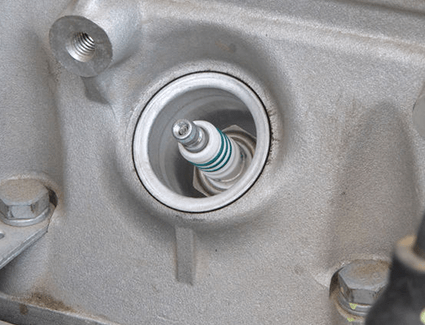

Spark plugs were invented over a century ago, replacing less convenient and more dangerous alternatives that had been used before. Spark plugs have remained an important part of gasoline-powered internal combustion engines ever since. But, important as they are, these parts aren't often very well understood. On this page, we'll take you through some things we think are good to know about spark plugs, and our experts will be glad to answer any other questions you may have.

4. The Purpose of Spark Plugs
The combustion that powers your Subaru vehicle's engine takes place inside combustion chambers, or cylinders. A mixture of fuel and air is brought inside the cylinders; in modern direct injected engines, fuel injectors spray fuel directly into the cylinder as clean air is sucked in by the piston as it travels away from the cylinder head. After the fuel and air enter the chamber, the intake valve closes and the piston moves up the cylinder, compressing the gas. At this point, the spark plug creates a spark that jumps from one electrode to another. This causes the mixture to combust, forcing the piston back down the cylinder before the exhaust gases exit out of the exhaust valve. The spark plugs do this several hundred times a minute, so they're hardworking little components!
If you're driving a vehicle with a diesel engine, a spark actually doesn't cause combustion. Instead, it's compression that causes the fuel to combust. However, Subaru doesn't currently sell any diesel cars in the United States. So, if you're driving a commercially available Subaru, it will be equipped with spark plugs.

3. Signs That Spark Plugs Need To Be Replaced
The spark plugs in your Subaru are typically long-lasting parts, often lasting tens of thousands of miles. But the center electrode can still wear down eventually, which is why you'll find spark plug replacement in the maintenance schedule included in your Subaru owner's manual. In addition to regular wear, there are other things that could cause a spark plug to go bad. These include a widened gap, oil fouling, or a cracked insulator. Whether the spark plugs are simply worn or have gone bad, a plug that's not functioning properly is likely to cause trouble. You may experience a rough idle, slower acceleration, or decreased fuel efficiency. It may even be more difficult to start your vehicle! A bad spark plug can also cause your engine to misfire, which will usually also trigger the check engine light.
2. Different Types of Spark Plugs
When you're choosing new spark plugs for your Subaru, you'll find new parts that boast a wide variety of materials, from copper to iridium. The difference between these types of spark plugs may seem small, but there is a real difference in function and longevity.
Standard spark plugs are often called copper plugs. Actually, most spark plugs are made with a copper core. Because copper is a soft metal, the center electrode (which is an extension of the core) is coated in a nickel alloy. Though these standard spark plugs work well, they tend to have a shorter lifespan than some others. For this reason, platinum and iridium spark plugs have become more common. Platinum lasts longer than nickel alloy, and iridium lasts longer than platinum. Both types of spark plugs can come in single or double varieties. A single platinum or single iridium spark plug has a disc of that metal on the center electrode, while a double platinum or iridium spark plug has platinum or iridium on both the center and side electrodes.

1. Can You Replace Your Own Spark Plugs?
It is possible to replace your vehicle's spark plugs on your own, though there are a few caveats. The first is that it's best to use OEM parts or factory-approved parts to avoid compromising the quality of your engine. The second is that replacing spark plugs correctly requires a certain amount of know-how, as well as some special tools. While getting a spark plug socket for a socket wrench may be easy, it's also best to use a gap gauge to double-check the new spark plugs. What's more, following the manufacturer's specifications is an important part of the replacement process; over-tightening the new spark plugs can actually damage the cylinder head. If you'd rather have an expert handle the replacement, the technicians at Capitol Subaru are here to help.
Capitol Subaru of Salem
920 Auto Group Ave NE
Salem, OR 97301
- Sales: 503-587-5500
- Service: 503-587-5500
- Parts: 503-587-5500







